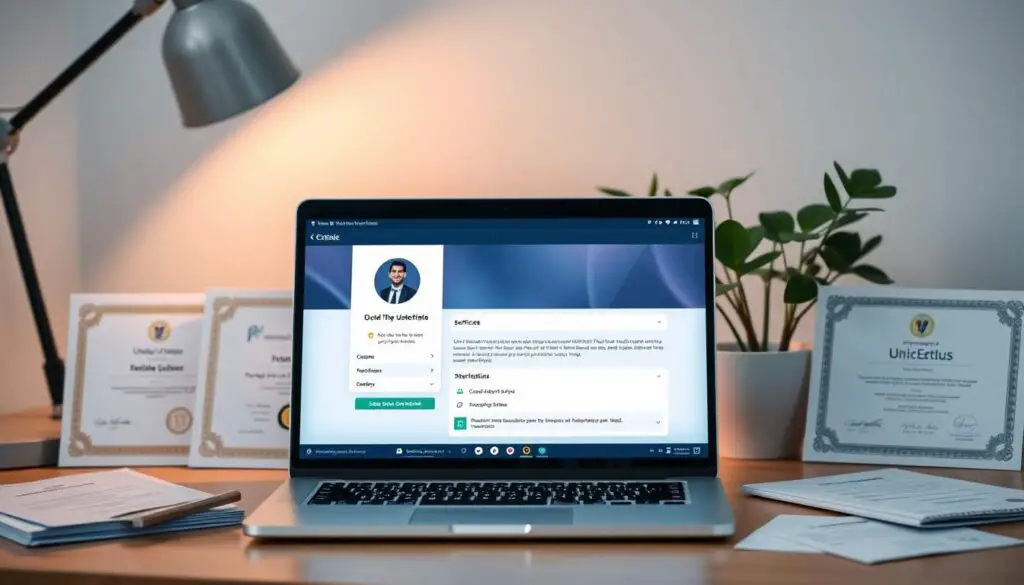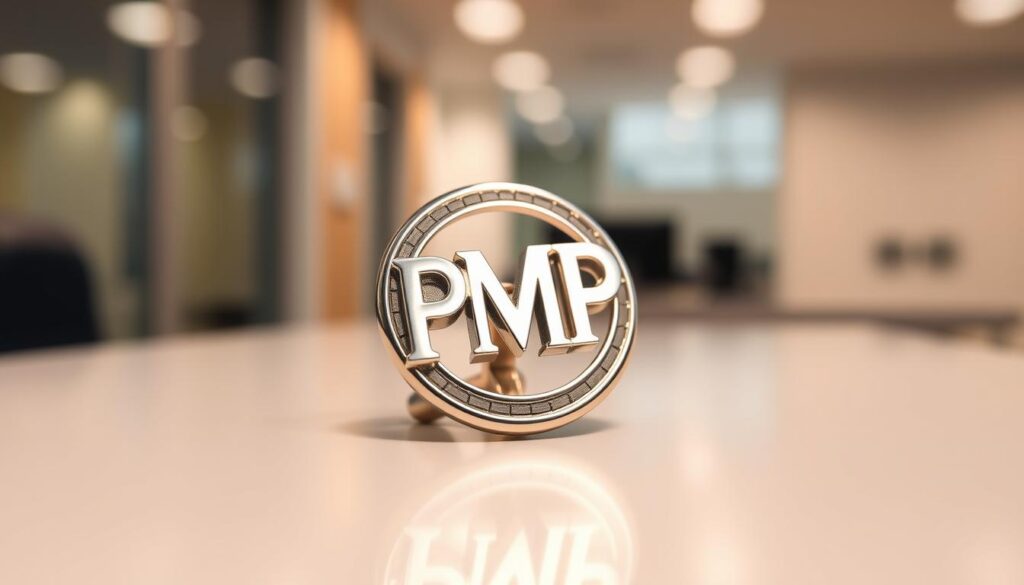Congratulations on passing the PMP Exam! Getting your PMP Certification shows you’re a pro in project management. Now, it’s time to make the most of your achievement. This guide will help you with the steps after passing your PMP Exam.
These steps include getting your certification, updating your info, and continuing your education. By doing these, you’ll boost your career and keep growing professionally.
Receive Your PMP Credential Certificate
After you pass the PMP exam, you become a PMP credential holder. This is a big deal for your career. It shows you’re an expert in project management. Knowing how to use your new credential is key.
Understanding the Certification Process
When you pass the exam, you get your results right away. You can see your PMP certification in the PMI Portal within 72 hours. Then, you’ll get a physical certificate, a letter, and info on how to keep it in 6-8 weeks.
To keep your certification, you need 60 PDUs every three years. If you don’t get them, you’ll have to retake the exam.
What is Included in Your Certification Package
Your package includes:
- The PMP Credential Certificate, marking your achievement
- A congratulatory letter from PMI
- Instructions for maintaining your certification
- Information regarding PDUs to sustain your status
- A notice about your inclusion in the PMP directory within 48 hours of passing the exam
| Item | Details |
|---|---|
| Certification Results | Available immediately after exam completion |
| PMP Certificate Access | Viewable in PMI Portal within 72 hours |
| Mail Delivery Time | 6-8 weeks after passing the exam |
| PDU Requirement | 60 PDUs over 3 years |
| PMP Directory Update | Details listed within 48 hours |
| Lapel Pin Request | Available at no extra cost |
Update Your Professional Information
After passing the PMP exam, it’s key to update your professional info. Start by updating your resume and online profiles to show your new credential. This change boosts your visibility and can lead to new career chances.
Revise Your Resume and Online Profiles
To update your info, revise your resume, LinkedIn profile, and other online sites. Here are important things to include:
- Highlight your PMP credential on your resume.
- Change your LinkedIn profile to “FirstName LastName, PMP” for work.
- Make sure your business cards show your new title.
- Update your online biographies on platforms you use.
Add the PMP Credential to Your Name
When updating, add your PMP designation to your name. This step clearly shows your skills to others. It shows you’re serious about your work. Include it in all important documents and profiles to prove your credibility.
Utilize Your Digital Badge on Social Media
You’ll get a digital badge after passing the exam. Use this badge on social media to promote your achievement. Sharing it does several things:
- It makes you more visible to peers and recruiters.
- It highlights your project management skills and dedication.
- It lets you celebrate with your professional network.
Adding the digital badge to your profiles makes your online presence stronger. It proves you’re a certified project manager.

Request Your PMP Lapel Pin
Getting your PMP Lapel Pin is a big step after you earn your certification. It shows you’re a certified project manager. It also helps you connect with others in your field.
How to Request Your Lapel Pin
Getting your PMP Lapel Pin is easy. Just follow these steps:
- Log into the PMI website with your login info.
- Go to the Marketplace section.
- Put the PMP Lapel Pin in your cart. It’s free.
- Finish the checkout to send in your request.
The Significance of the Lapel Pin
The PMP Lapel Pin is more than just a symbol. It shows your hard work and skills in project management. Wearing it makes you stand out and can start interesting conversations.

By showing off your PMP Lapel Pin, you show you’re serious about your work. It boosts your image and connects you with others in your field.
Engage in Continuing Education
After getting your PMP certification, it’s key to keep learning. You need to earn at least 60 Professional Development Units (PDUs) every three years. Knowing how PDUs work helps you plan your growth.
Understanding Professional Development Units (PDUs)
PDUs are vital for keeping your certification. One PDU is like one hour of learning, teaching, or volunteering. You must get 35 PDUs from educational activities every three years. These should improve your technical skills, leadership, and business management.
Types of Activities to Earn PDUs
You can get PDUs in many ways. These include:
- Attending live webinars or workshops
- Participating in online courses related to project management
- Contributing to professional associations or volunteering in project management roles
- Engaging in self-directed learning, such as reading articles or books on project management
Using a mix of these methods helps you earn PDUs and stay current with project management trends.
Maintaining Your Certification
To keep your certification, you need to plan carefully. You must earn 60 PDUs every three years. This includes 24 PDUs from specific courses to renew your PMP certification. If you don’t meet these requirements, you could lose your certification.
Continuing education is important. Getting extra certifications can boost your career. They make you stand out in a crowded job market. You also get chances to network and grow professionally.

| Activity Type | PDU Hours | Description |
|---|---|---|
| Live Webinar | 1 PDU | Participate in an hour-long interactive session focused on project management. |
| Online Course | Varies | Enroll in structured courses offered by PMI or accredited institutions. |
| Volunteer Work | Varies | Engage in volunteer opportunities that contribute to project management initiatives. |
| Self-Directed Learning | 1 PDU | Read articles or books related to project management practices. |
Explore Career Advancement Opportunities
Getting a PMP certification can really boost your career in project management. It opens doors to many job roles in different industries. This certification is highly valued by employers, making you stand out in a competitive job market.
Potential Job Roles After PMP Certification
With a PMP certification, you’ll find many job opportunities across various sectors. Some common roles include:
- Program Manager
- Portfolio Manager
- Project Management Officer
- Senior Project Manager
- Project Coordinator
- Project Scheduler
- Office Director
These jobs offer leadership roles and come with more responsibilities. They also often have higher salaries. A PMP certification shows you can manage projects well and lead teams, helping you advance in your career.
Benefits of Networking as a PMP
Networking is key to making the most of your PMP certification. Joining local PMI chapters lets you meet other project managers. You can share experiences, find job leads, and learn about industry trends.
- Access to exclusive job postings
- Mentorship opportunities with seasoned professionals
- Insight into industry trends
- Collaborative projects that enhance skills
Building relationships in the project management world makes you more visible for leadership roles. By taking advantage of job roles and networking, you can grow your career significantly.

| Job Role | Key Responsibilities | Potential Salary Range |
|---|---|---|
| Program Manager | Oversee multiple projects, align with organizational goals | $100,000 – $140,000 |
| Portfolio Manager | Manage a collection of projects, strategic alignment | $120,000 – $160,000 |
| Project Management Officer (PMO) | Standardize project management practices, reporting | $95,000 – $130,000 |
| Senior Project Manager | Handle large projects, manage complex teams | $110,000 – $150,000 |
Conclusion
Getting your PMP Certification is a big step in your project management career. It shows your knowledge and dedication to learning more. As you follow the steps in this guide, it’s key to show your PMP certification in your work life.
This means updating your resume, keeping up with new learning, or looking for new jobs. Each step you take helps you grow professionally.
See your PMP certification as a starting point, not the end. Your career can get better by networking and staying current with project management trends. Passing the exam is just the first step in a new chapter of your career.
Managing what you do after the exam helps you grow as a project manager. The PMP certification not only opens doors to new jobs but also connects you with others who value excellence. Keep aiming for more, and let your certification lead you to new achievements.
Source Links
- What Comes After the PMP® Certification – Project Management Academy Resources
- What’s Next After PMP Certification?
- PMP Exam Success: Next Steps and Certification Guide | PMP Exam Online
- Once You have Passed the PMP Exam … – Updated PMP, PMI-ACP & ITIL Exam Tips 2023
- The PMP Exam 2023
- Skills to Land a White Collar Management Job in PMP | All you need to know [ OverView ]
- Read p2a; Passing the Prince2agile® Practitioner Exam at Your First Attempt
- What’s New in PMBOK 6th Edition
- Continuing Education in Project Management – PDU Credits
- Outlining the PMP Exam Journey- Some Prep Pointers and Things to note
- Project Manager Career Path – Step by Step Guide
- My Journey to PMP Certification: A Step-by-Step Guide to Achieving Success
- Mastering the PMP Test: Key Strategies and Tips for Success
- 10 Steps to Getting Your PMP – People and Projects Podcast




